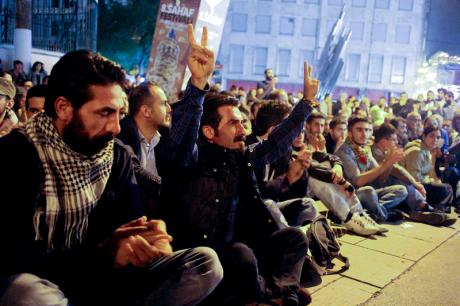What went wrong in Kobani?
By: Wafiq Al-Samarrai/Asharq Alawsat
Sunday, 19 Oct, 2014
I have been of the opinion that directing airstrikes on Islamic State of Iraq and Syria (ISIS) positions in Syria has been a mistake since the international campaign against the group began. ISIS must first be defeated on Iraqi territory and thereby driven out of the country and cornered in Syria, as a prelude to the terrorist group’s final destruction. It has taken US strategists some time to understand the situation; there is no harm in this delay so long as the international coalition commits to this tactic on the ground and, in particular, intensifies low-altitude airstrikes.
If the security setbacks in Mosul and Tikrit can be attributed to the shock factor, some of the subsequent incidents that have taken place defy logic. Areas such as Tal Afar, Sinjar, Nineveh valley and western Ramadi should never have fallen into ISIS hands. But their capture by ISIS reflects the panic that hit the defense philosophy of Iraqi government and Kurdish Peshmerga forces. Were it not for the popular mobilization which saw hundreds of thousands of Iraqi volunteers joining militias to fight ISIS, the situation in Iraq would have slipped out of control and the country as we know it would have been eradicated. Everything that happened previously can be explained, in one way or another. However there is no explanation to ISIS militants carrying out maneuvers close to Baghdad four months after the group was supposedly pushed back; this is something that cannot be overlooked. This is even after international forces have carried out hundreds of sorties over Syria and Iraq, striking ISIS positions in both countries.
ISIS has demonstrated unusual persistence in its attack on Kobani and continues to besiege the town. The Islamist group has managed to continue fighting on several fronts in addition to fighting psychological war by threatening to capture Baghdad.
With the attack on Kobani preoccupying ISIS, Peshmerga forces should have carried out extensive operations in a bid to retake the Turkmen-majority city of Tal Afar and the predominantly Yazidi city of Sinjar. Instead, ISIS has been left to roam freely in this region without coming under any serious pressure in key strategic areas in and around Mosul. This has led the Islamist group to take the initiative elsewhere. All of this reveals a lack of strategic thinking and cooperation as seen by the Iraqi central government’s lack of influence over Kurdish defenses and the marginal and insignificant coordination between Iraqi and Kurdish forces in Diyala, Salah Al-Din and Kirkuk.
While the inability of the Kurdistan Regional Government (KRG) to influence the Turkish position—despite their commercial interests and coordination on other issues—impacted the relationship between the political blocs in the region, dealing a serious blow to KRG aspirations to lead international Kurdish nationalist sentiments. Kurds in Turkey and Syria have been very disappointed by the failure of the KRG to adopt a reasonable position on the events in Kobani. Reports even suggest that the international coalition’s airstrikes have caused losses in the ranks of Kurdish Islamist groups fighting ISIS. High-altitude laser-guided missiles have proven less effective than the deployment of combat helicopters flying at medium and low altitudes. An offensive of this scale requires a direct and coordinated ground offensive to engage with opposition forces.
Despite all this, the Kobani operation has brought the people of Iraqi Kurdistan closer to Baghdad, paving the way for the convergence of interests between Iraq’s central government and Kurdish parties away from the Kurdistan Alliance. This will also prepare the ground for the Patriotic Union of Kurdistan (PUK) to restore its clout regardless of the setback it suffered during the previous elections. This could ultimately redraw the political equations in Baghdad based on the new web of mutual interests between the various political parties and figures.
Major changes in the fight against ISIS are unlikely to take place in the foreseeable future. Such changes would require a radical development on the ground and aerial capabilities within a time-frame that cannot be measured in weeks. Unless something completely unexpected happens, ISIS will gradually lose its momentum and be pushed back. Although ISIS’s control of major cities represents a significant obstacle for the international coalition, the war on ISIS is going to be a protracted one unless the West decides to directly engage the Islamist group.




















